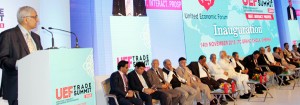*Calls for blending religious education with modern outlook
Excelsior Correspondent

CHENNAI, Nov 14: Jammu and Kashmir Chief Minister Mufti Mohammad Sayeed today said “educational backwardness” of Muslims was the reason for their inability to progress economically and insisted that education was “most critical” for the uplift of the community.
“There is no doubt that educational backwardness is the main reason why we have not been able to progress economically,” he said in his keynote address at the inaugural United Economic Forum Summit-2015 at ITC Grand Chola here. He was one of the start speakers at the Summit where he spoke on the topic of “education and employment: critical requirements to minority community upliftment”.
Sayeed said he had always believed education is “most critical to uplift our community”. The “decline” in the socio-economic and education status of the Muslims started as early as the 18th century, he said while recalling that “pioneers and geniuses” like Sir Syed Ahmed Khan and freedom fighter Maulana Abul Kalam Azad had advocated education for development.
While Khan started Mohammaden Anglo-Oriental College, known as Aligarh Muslim University (AMU) now, Azad understood the importance of education and believed that “Muslims could carve out a distinct niche for themselves in a secular and diverse India”, he said.
Azad, who Sayeed recalled had opposed partition of the country, was chosen by Jawaharlal Nehru as independent India’s first Education Minister and he heralded the nation’s modern education, the Chief Minister said.
He said he did not find any “stark contradiction” between the need for religious education and the importance of having a secular modern outlook in today’s world, recalling he himself had studied in a Madrassa before graduating in law from AMU.
Decrying those who malign Islam’s image across the globe, the Chief Minister described it as a great religion of peace and tranquility and called for strenuous efforts to spread its message far and wide.
Referring to recommendations made by the Sachar Committee, appointed by the previous UPA Government to study the socio-economic conditions of Muslims, he said it had found that their status in many areas “is lower than the status of Scheduled Castes and Scheduled Tribes”.
The Committee’s recommendations included setting up high quality Government schools, including those exclusively for girls, in all areas of Muslim concentration, imparting skill training and making Madrassa-educated persons eligible for formal technical education besides providing financial support to them, he said.
The Committee has also recommended that UGC should be encouraged to evolve a system where part of the allocation to the colleges and universities is linked to the diversity in the student population, teacher training should compulsorily be included in its curriculum components which introduce the importance of diversity/ plurality within the country and sensitize teachers towards the needs and aspirations of the Muslims and other marginalized communities.
The other important recommendation of Sachar Committee which the Chief Minister highlighted was recognition of the degrees from Madarsas for eligibility in competitive examinations such as the Civil Services, Banks, Defence Services and other such examinations. “The idea is to facilitate a process whereby Madrassa graduates too have a choice and an incentive to participate in these employment streams”, he said.
He pointed out the various efforts by his Government in education and employment sectors in his State, including upgrading schools, creating satellite campuses of universities and imparting skill development training.
Describing J&K as the only Muslim majority State in the country which aptly demonstrates the success and talent of country’s biggest minority, the Chief Minister identified education, skill development and employment as central pillars of his vision for future of J&K.
Outlining his vision to make J&K knowledge hub ‘in the foothill of Himalayas’, Mufti Sayeed dreamed of making the place where the brightest young men and women can come from all over the country to study, live and work together in an atmosphere that offers world-class infrastructure. “J&K always has been a skills and knowledge society. Renaissance of knowledge will be my Government’s top priority,” he affirmed.
The Chief Minister invited the education entrepreneurs to join him in his journey to educate and power the minority community, in particular Muslims for which he offered to work together in partnership.
A galaxy of dignitaries including Tamil Nadu Minister for Industries, P Thangamani, former Union Minister for Minority Affairs, A Rahman Khan, former Minister for Foreign Affairs, Singapore, Zainul Abidin Bin Mohammad Rasheed, Ambassador of Iran, Ghulamreza Ansari, Nawab of Arcot, Al-Haj Abdul Ali Khan Bahadur, Chitra Devi from Consul General of Malaysia, former IAS officer, Moosa Raza, besides hosts of other dignitaries including President of UEF, Ahmad A R Buhari were present on the occasion.
Shoukath Sherif, Vice President of UEF, presented vote of thanks to the chief guest, dignitaries and guests in the audience for attending the inaugural session of the two-day Trade Summit. Also present on the occasion were Vice Presidents UEF, Dr T Kamal, M S Tajudeen and M Razzack and Secretary UEF, A K Abdullah.

